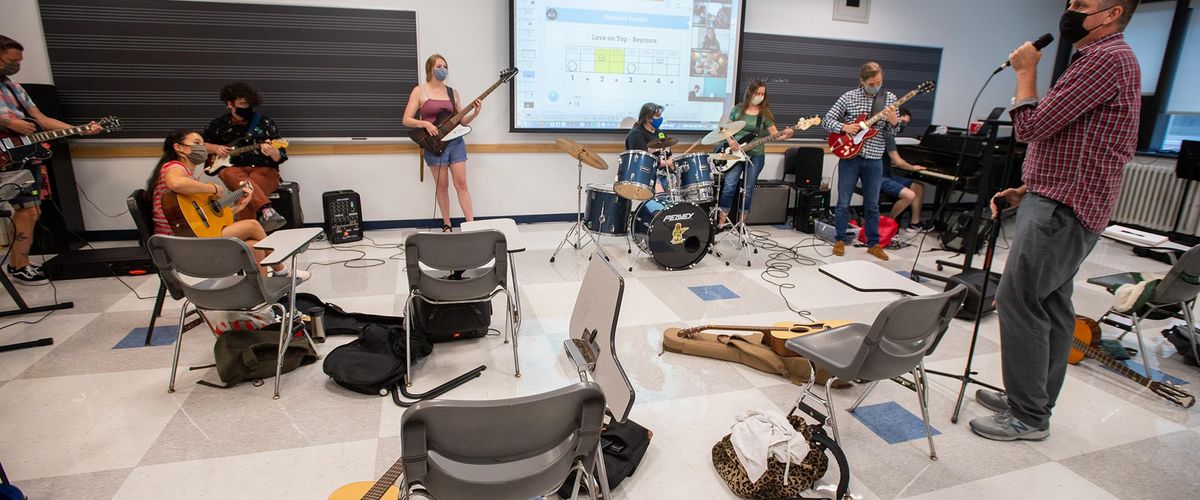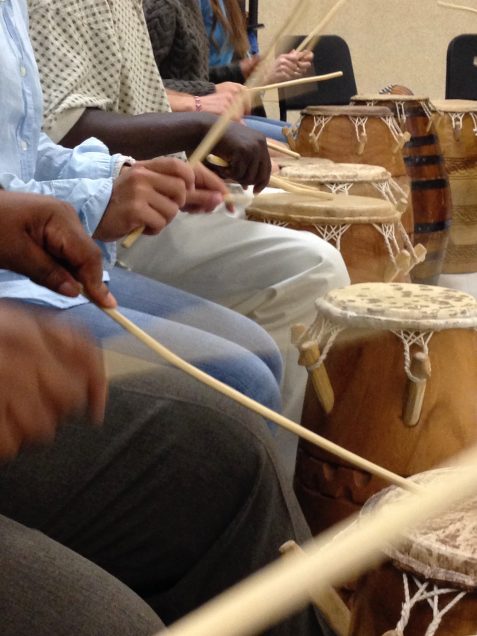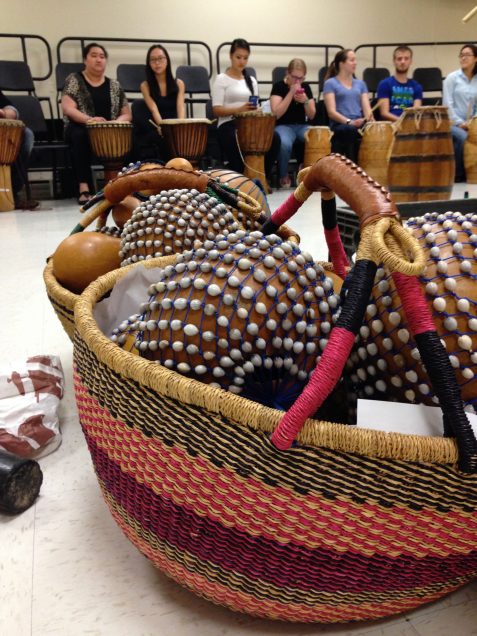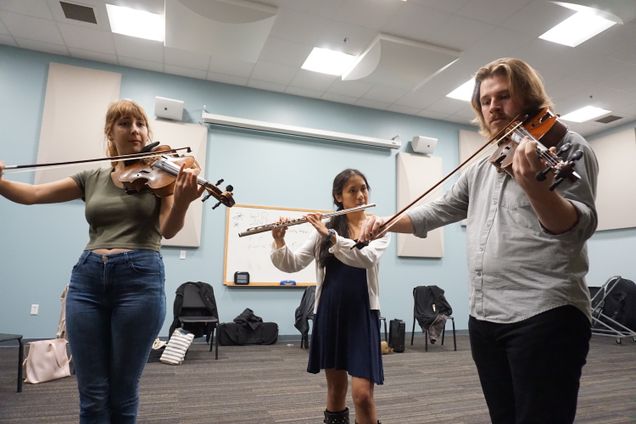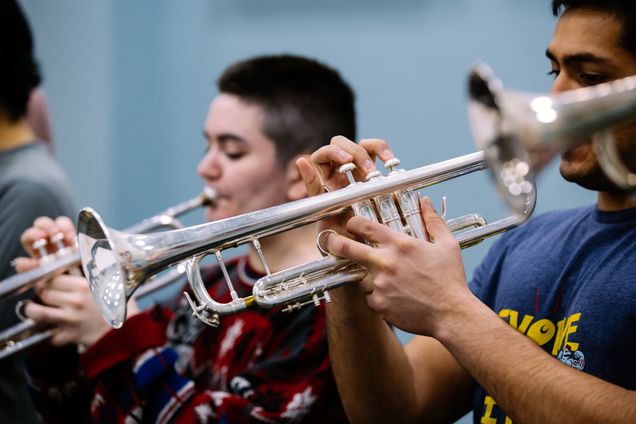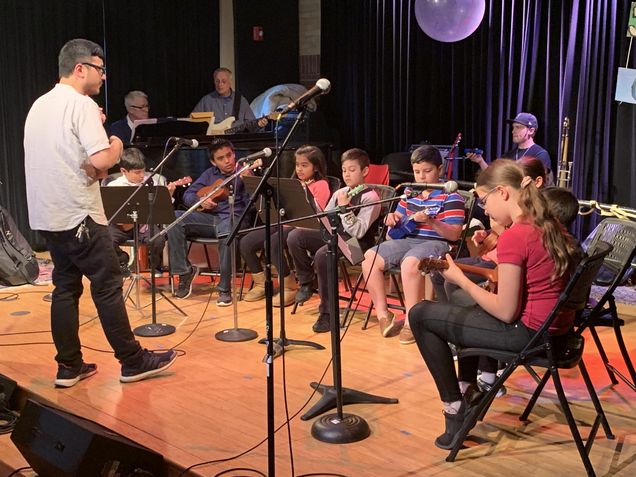Students complete at least 8 courses and at least 32 units: 12 units of music education, 4 units of music theory, and 16 units of approved electives. Courses run in seven-week intensives where students take one course at a time. Students typically complete two courses per semester and can complete the program in 18-24 months. CFA students taking courses in the online program should register for a maximum of two 4-unit courses per semester (8 units). Boston University considers students registered for 12 units per semester to be full-time and are charged the Boston University full-time tuition rate.
Some online MM in Music Education degree students take advantage of our summer session, completing course work on campus, while enjoying Boston’s cultural offerings and summer sea breezes. More information including session dates, financial aid, and tuition rates is communicated to students during the academic year.
Graduate students must maintain a semester and cumulative grade point average (GPI/GPA) of at least 3.00 to be in good academic standing and to graduate from the College of Fine Arts.
Online Music Education Core Courses
(8 units required, choose two courses. Third course could be used as an approved elective.)
ME740 (4 units)
In this course, students become acquainted with a variety of research that informs music education, learn both to critique and apply that research, and develop their scholarly writing skills.
ME741 (4 units)
The purpose of this course is to examine and discuss historical and contemporary philosophical ideas and problems in music and music education. A goal is for students to develop a sharpened sensitivity to past and present thought (primarily, but not limited to historical and philosophical thought) in the field of music education in order to better inform their own curricular and instructional choices.
ME742 (4 units)
The purpose of this course is to critically examine psychological and sociological concepts as they relate to music and education. Topics include key issues and concepts in psychology and sociology; psychology as related to music education processes; problems encountered in the sociology of music education; and cultural influences that affect both the psychology of the individual and the sociological aspects of group dynamics.
Music Education Capstone Course
(4 units, 1 course required)
ME759 (4 units)
This 14 week course is the final class required in the Master of Music in Music Education degree program. Students focus on the development of a site-specific music curriculum, including the philosophical, psychological, and sociological foundations for that curriculum as well as the prospective implementation and assessment of the project. Because the nature of the project is to bring together elements from all previous coursework, it is graded as the Comprehensive Examination for the degree program.
Required Music Theory & Musicology
(4 units, 1 course required)
ME750 (4 units)
The purpose of this course is to cultivate historical and cultural understandings of varied repertoire and musical engagements. Throughout the course, current understandings in music theory, music analysis, musical transmission, and socio-historical contexts will be both examined and interrogated.
Approved Electives
(16 units, choose 4 courses)
AR670 (4 units)
This course provides an introduction to issues of policy and advocacy that are relevant to arts education practitioners. We explore the nexus between problems in arts education and the systems that influence schools, cultural organizations, and society. We identify and analyze policies that shape our own professional settings as well as the agencies and partners involved. We research stakeholders, socio-political contexts, resources, and strategies for improving arts education with culturally relevant advocacy. The course centers on drafting a policy proposal and advocacy plan that empowers artist-teachers to take stock of their own leadership skills and apply them to contemporary issues.
ME541 (4 units)
The course will include activities designed to introduce students to significant technologies that can support music teaching and learning. These technologies will include music sequencing/production, recording, audio and MIDI editing, computer-based notation, graphic-based web authoring, social media for music distribution, and computer-assisted instruction software. The majority of learning activities will begin with a teacher demonstration of a set of skills in music software. Each demonstration will be followed by an assignment designed for students to practice those skills and demonstrate mastery of techniques. Information on applying for Level I TI:ME (Technology Institute for Music Educators) certification will be provided at the end of the course.
ME542 (4 units)
This course serves to expand the knowledge that many teachers have about uses of technology for teaching music. Students explore music technology pedagogy; that is, the practice of teaching music in a technologically enhanced environment and the special kinds of teaching skills required to do so effectively. Students examine theoretical foundations of the uses of technology for music teaching, including theories of student interaction with technology, multimedia principles, and technology-infused music curricula. Students will design a technology based curricular unit of music study and implement that unit in a real-world scenario such as their own classroom or studio.
ME545 (4 units)
This course is designed to expand awareness of the intersections between music, education, and society as they relate to issues of power, privilege, and marginalization within US, educational, and global contexts. Students will participate in group discussions, individual reflection, and student-designed projects to increase awareness of their own biases and assumptions and deepen reflective practice in music making and teaching. Upon completion of the course, students should be better prepared to engage in acts of social justice, transform structural biases, build coalitions to effect change, and advocate for marginalized students in their own care.
ME548 (4 units)
To model real-world arts-integration implementation, students will engage in team-based learning and project development between arts and non-arts subjects, and/or between the arts disciplines. Collaborative projects will be informed by the histories, theories, philosophies, approaches, and exemplars of arts integration programs in North America.
ME608 (4 units)
The purpose of this course is to provide educators with research-based strategies they can use to include all students in their music classrooms, ensembles, and private studios by eliminating barriers that may prevent certain students from learning. This course is intended for the educators at all levels, pre-K through higher education, who seek to make their classrooms, ensembles, and private music studios inclusive of all learners while providing a quality music education to every student.
ME751 (4 units)
Drawing upon the social, cultural, political, and economic milieu including movements in music education, music therapy and ethnomusicology, this course first examines reasons for the growth and development of community music. Students will be asked to trace an aspect of community music that may be considered as part of its heritage and also to evaluate and critique a contemporary community music project through fieldwork. Students will then be in a position to articulate their own vision for community music both as a practicum and as a scholarly pursuit.
ME753 (4 units)
This course will provide an overview of early childhood development and education. Students will then investigate the musical development of very young children, and explore the components of research-based, developmentally appropriate early childhood music education. Special attention will be paid to the role of play in childhood and designing and implementing play-based musical experiences.
ME840 (4 units)
Study of current issues influencing the state of music education in schools. Focus on the interpretation, implementation, and development of policy. Topics include public policy, politics, advocacy, diversity, evaluation, and curriculum.
ME850 (4 units)
This course builds on other social justice-based courses offered by the Music Education Department: CFA ME 545: Power, Marginalization, and Privilege in Music Education; ME 751 Community Music; and ME 550 Empowering Song – Music with Heart, Body, and Mind. Although this course is a companion to the above courses, it is self-contained and discrete. For students who have taken any of the above-mentioned courses, they may already be awakened to the issues of systemic marginalization. For others, this course may serve as a general introduction to social justice and music education. This course intends to cover a body of equity and justice theories as a means of impelling a reconsideration of music education curricula to deepen the students’ reflection, and to foster a strong connection between justice and music education. Students will participate in group discussions and individual reflections to increase awareness of justice and equity particularly as they relate to themselves as music educators. As part of this process, students will engage in project development. Upon completion of the course, students should be better prepared to engage in acts of social justice and to work for music education as a force for social change.
MH750 (4 units)
This course will work toward a 21st-century aesthetic of musicking. Expanding on Christopher Small’s reevaluation of performing and listening, students will investigate what it means for individuals and collectives “to musick” in the 21st century through notions of sound, (dis)place(ment), disability, ecology, media, ethnocentrism, morality, empathy, and provocation. After conceptualizing these frameworks, students will apply them to their communities to ground this understanding in the diverse worlds in which they live, teach, and work.
MH835 (4 units)
Overview of early music in the colonies. Various attempts to create an individual “American” musical style. Diversity of influences: European, African-American, Indian, Spanish-Mexican, religious, jazz, folk song, minstrel, etc. Music of Billings, Lowell, Mason, Gottschalk, MacDowell, Ives, Gershwin, Copland, and others.
MH837 (4 units)
The course addresses elements and aspects of African-American music which extend beyond the confines of blues, including early rock’n’roll, hip-hop, 1940s big band jazz, and beyond. Additionally, the course incorporates a variety of intertextual elements, including literary cross-currents in African-American linguistic theory (as relevant to music), including Henry Louis Gates’ seminal text Signifying Monkey and more.
MH862 (4 units)
This course explores a selection of musics from sub-Saharan Africa in ethnographic context, with a particular focus on their practical application in the Western classroom or ensemble. This course is an intensive introduction to vastly diverse and contradictory music from a variety of African cultures. Rather than attempting a cursory regional overview, we will be exploring specific musics thematically. The course aims to provide you with a sense of the intensity of African musical creativity, its global ubiquitous influence, and an appreciation of how important music is to individual lived experiences.
Students will find a variety of source material throughout this course. It includes scholarly writing, online sources, videos, sound recordings, musical exercises, journalistic material, as well as material drawn from the personal experiences of the instructor. Additional resources on African music and culture are included in the bibliography. Students are always encouraged to research additional material in this vast subject area. Upon successful completion of this course, students will have gained the knowledge and skill required to bring African music into their own classroom or ensemble.
MT600 (4 units)
Investigations (systemic and empirical) into formal and compositional procedures of selected masterworks from the tonal repertoire. Lectures lead to individual analytical projects.
*pre-requisite is ME750, Theoretical and Cultural Applications
MT630 (4 units)
Contemporary orchestral techniques, focusing on scoring for modern winds, brass, strings and mixed ensembles, including full orchestra. Concepts include chord spacing, melodic projection, layering and delineation of material, and extended instrumental techniques. Materials are approached through readings, listening, writing and analytical work.
*pre-requisite is MT 600, Analytical Techniques.
MT781 (4 units)
Analysis of combo, vocal and jazz ensemble literature from a variety of grade levels. Development of arranging and composing skills in the jazz idiom. Overview of score study, rehearsal, and programming topics pertaining to jazz ensemble development and leadership. Individual analytical and arranging projects.
*pre-requisite is MT 600, Analytical Techniques.
TA801 (4 units)
Students will explore and critically engage with materials and approaches in the principal areas of present-day church musicians including: theology of music ministry, resources, choral and vocal techniques, conducting, the organ and other instruments, alternative and contemporary worship, and professional concerns. They will deepen their understanding and integration of the multi-faceted skills inherent in the practice of music ministry. This course is offered through BU’s School of Theology.
